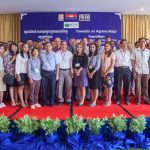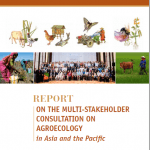
31 downloads
Title of document: Consolidated account of the 4 national multi stakeholder workshops on agroecological transition in the Mekong Region Authors: Pierre Ferrand Ministry/Government Agency/Organisation: ALiSEA Year of publication: 2016 Geographic focus: Cambodia, Laos, Myanmar & Vietnam Summary: This report presents a short consolidated account of 4 national multi-stakeholder workshops addressing Agroecological Transition in the Mekong Region and bringing together 225 participants that have been organized between March and June 2016 (Myanmar, Cambodia, Vietnam Lao PDR). Such workshops aimed at sharing knowledge, information and actions between agricultural development stakeholders. Read More

29 downloads
Title of document: Proceedings of the national multi stakeholder workshop on Agroecology Transition, Cambodia Authors: Lucie Reynaud, Pierre Ferrand and Dr Saythong Vilayvong Ministry/Government Agency/Organization: ALiSEA Year of publication: 2016 Geographic focus: Cambodia This report presents the main findings of the discussions held during the 2 days workshop addressing the agroecology transition in Cambodia in Phnom Penh on the 30th and 31st of March 2016. Read More

31 downloads
Title of document: Proceedings of the national multi stakeholder workshop on Agroecology Transition, Myanmar Authors: Pierre Ferrand, Dr Htet Kyu and Lucie Reynaud Ministry/Government Agency/Organization: ALiSEA Year of publication: 2016 Geographic focus: Myanmar This report presents the main findings of the discussions held during the 2 days workshop addressing the agroecology transition in Myanmar in Yangon on the 7th and 8th of March 2016. Read More

12 downloads
Title of document: Report on the Multi-Stakeholder Consultation on Agroecology in Asia and the Pacific, FAO, Authors: FAO Ministry/Government Agency/Organization: FAO Year of publication: 2016 Geographic focus: Asia and the Pacific Seeking to gain a better understanding of the role that agroecology can play in eradicating hunger and malnutrition, FAO organized the International Symposium on agroecology for Food Security and Nutrition in September 2014 in Rome, Italy, followed by three regional meetings in Asia and the Pacific, sub-Saharan Africa and Latin America and the Caribbean. The Multistakeholder Consultation on agroecology for Asia and the Pacific was held in Bangkok, Thailand on 24-26 November 2015. FAO acted as a facilitator to enable debates and foster collaboration among a variety of actors in order to advance science, knowledge, public policies, programmes and experiences on agroecology, supporting the strengthening of the already-extensive evidence-based knowledge for agroecological approaches in agriculture. The participants in this meeting, representatives of governments, civil society, including peasants, fisherfolks, pastoralists, urban communities, indigenous peoples, women’s organizations, youth and others, academia, and private sector, issued recommendations for the development of agroecology in Asia and the Pacific after two days of discussion. Read More
3 downloads
Title of document: Enhancing Agricultural Livelihoods through Community Institutions in Bihar, India Authors: Debaraj Behera, Arvind Kumar Chaudhary,Vinay Kumar Vutukuru, Abhishek Gupta, Sitaramachandra Machiraju & Parmesh Shah Ministry/Government Agency/Organization: World Bank and Bihar Rural Livelihood Promotion Society Year of publication: 2016 Geographic focus: India, Bihar State Bihar’s agriculture sector employs more than eighty percent of the labor force and more than fourfifths of these farmers are small and marginal. They have one of the lowest agricultural productivity in India that has not increased due to several constraints. Jeevika, a project jointly supported by the World Bank and the Government of Bihar, has piloted, customized and eventually scaled-up several innovative livelihood interventions to improve the well-being of poor households in Bihar. A number of innovative aspects account for the success of these livelihoods programs in the state. Foremost among these is the fact that it was implemented through community-driven and community-owned institutions. The institutional platform that was facilitated by the project has enabled the creation of a single-window system at the doorstep of small and marginal farmers. Farmers can now demand better services from the public sector, access credit from commercial banks, and experiment and customize various technologies. This note will focus on System of Crop Intesification’ (SCI), which has evolved from a well-known farming methodology called System of Rice Intensification. It has been customized and adopted for wheat, green gram, oil seeds and vegetables in Bihar. The participant farmers have witnessed 86% increase in rice productivity and 72% increase in wheat productivity. The profitability of rice cultivation has increased 2.5 times and has almost doubled for oil-seeds. Since 2008, implementation of SCI has contributed to an additional income increase of around US$10.7 million. Read More
60 downloads
Title of document: Agroecology Transition in Myanmar: Issues, Status and Stakeholder Mapping Authors: San Thein and Aung Thin Ministry/Government Agency/Organization: GRET / Village Integrated Development Association (VIDA) Year of publication: 2016 Geographic focus: Myanmar This report on situation review of agro ecological transition in Myanmar is the follow up feasibility study (Consultation workshop on agro ecology, held at Yangon, on 12 June 2013) with the support of Groupe de Recherche et d’Echanges Technologiques (GRET) conducting a stock taking of practices, actors, success stories and constraints to adoption of agro ecology principles in Myanmar agriculture sector. This study aims at further mapping agro ecological initiatives at local, state-divisional and national level. The paper is divided into three parts: the first part explains background context, the second reviews the policy and legal framework promoting or restricting the agro ecological activities and the third part is the explanation of six schools of agro ecological activities at country level, divisional (provisional) and local level and their linkages finally followed by brief discussion of allies and champions in respective activities. Read More
52 downloads
Title of document: Situation review of agro-ecology initiatives, stakeholders and networks in Lao PDR Authors: Phengkhouane Manivong and Souliyouan Viengkhamsone gte mso 9]>--> Ministry/Government Agency/Organization: GRET / Faculty of Agriculture Year of publication: 2016 Geographic focus: Laos The Situation review of agro-ecology initiatives, stakeholders and networks in Lao PDR reports the information and data on the six most significant agro-ecological practice/schools (SRI, CA, Organic Agriculture, IPM, Agroforestry and VAC/Integrated farming) collected between October to December 2015. It provides a current status of the policy framework, the stakeholders, the initiatives and the achievements related to the agro-ecology in Lao PDR. A desk review combined with interviews and field visits was used for this study. Read More
62 downloads
Title of document: Agroecological farming innovations: Case studies in Hoa Binh and Lam Dong province, Vietnam Authors: Pham Van Hoi & Ngo The An Ministry/Government Agency/Organization: GRET/CARES Year of publication: 2016 Geographic focus: Vietnam Given the increasing scope and impacts of environmental pollution and food poisonings in Vietnam since its agricultural sector started with further intensification with more chemical inputs used especially pesticides since early 1990s; increasing opportunity for agricultural exports; and more awareness of governments on importance of agricultural sector as well as agricultural exports which has contributed significantly to national economy since early 2010s, numerous important policies have been formulated to boost agricultural development towards more sustainable, notably on efforts of reduction of pesticide uses. This consultancy mission is a small part of the AFD project which aims at increasing the credibility and visibility of agro-ecology practices towards small-holder farmers as well as other relevant stakeholders such as consumers, policy makers, and private actors. Based on the firsthand information gathered from professional network and government websites, Hoa Binh and Lam Dong were selected for field study in which numerous AE innovative farmers were identified and interviewed for their exisiting farming practices and underlying reasons for restructuring their farms towards more ecological orientation. Read More
93 downloads
Title of document: Agroecology Stakeholder Mapping and Situation Review in Cambodia Authors: Proyuth Ly and Samphiron Sar Ministry/Government Agency/Organization: GRET Year of publication: 2016 Geographic focus: Cambodia The current report presented results from a study on agroecology stakeholder mapping and situation review in Cambodia conducted within the framework of AFD’s funded regional project “Toward Agroecology Transition in the Mekong Region”, implemented by GRET. The study is one of the four studies, conducted in parallel in four countries including Cambodia, Lao PDR, Myanmar and Vietnam. The overall objective of the study is to map agroecological initiatives at local and national level and provide a more detailed and accurate account of ongoing initiatives promoting agroecology across the region. The study involves desk reviews including national policy framework, technical reports, articles, books addressing the six identified agroecological practices (SRI, IPM, Organic Agriculture, Integrated Farming, Conservation Agriculture and Agroforestry), interviews with 21 actors actively promoting agro-ecological practices, and field visits to the outstanding sites in four provinces (Kampong Speu, Kandal, Takeo and Siem Reap). The results of the study is divided into five sections: a review of Cambodia’s policy/regulatory frameworks addressing agro-ecological practices, sustainable development, poverty reduction, food security, GI, GAP etc.; status of the six identified agroecological practices and enabling environment; stakeholder mapping and their account of ongoing initiatives; existing networks promoting agroecology; and stories from the fields. Read More
57 downloads
This document presents the lessons learnt from Sustainable Agriculture and Market Development Project (SAMADP). It was implemented in Paek district, Xiengkhouang province between 2009 and 2015 by Sustainable Agriculture and Environment Development Association (SAEDA) and District Agriculture and Forestry Office (DAFO) of Paek district with the funding from Bread for the World and Fastenopfer. This document describes the integrated approach of the project intervention especially on how the project supported small holder farmers in developing better production techniques, use of farmer expert in technology transfer, facilitation of farmer organization in improving production planning and marketing. In addition, it also shows impact of the project in improvement of farmer’s livelihood, strengthening of public extension services and ensuing sustainability of the environment. Lastly, it describes factors of success and limitations. Read More

 Asia & Mekong Region
Asia & Mekong Region  Cambodia
Cambodia  Laos
Laos  Myanmar
Myanmar  Other
Other  Vietnam
Vietnam